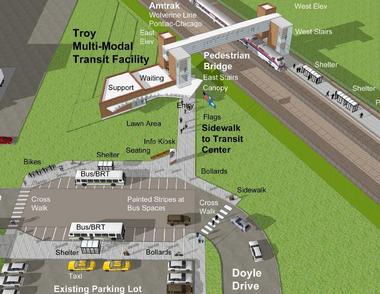Last month it looked like Southeast Michigan would be the site of yet another embarrassing transit failure, after City Council of Detroit suburb Troy voted to reject $8.5 million in federal funds for a transit center, citing Tea Party talking points.

But this near-disaster now has a happy ending thanks to a smart compromise and admirable leadership by the local business community. Troy's City Council last night voted 4-3 to continue the project, in reduced, $6.2-million form.
Credit is due to Troy's Chamber of Commerce, a strong, consistent supporter of the project, which helped negotiate the compromise to draw down costs by about $2 million while maintaining the station's status as a "gateway" center. The chamber even went so far as to assume operating costs for the center, which will serve an Amtrak line, the suburban bus system, taxis, and will even include bike infrastructure.
Michele Hodges, president of the Troy Chamber of Commerce, said, political considerations aside, the transit center was important to her members. Businesses in Troy, one of metro Detroit's most important job centers, believe the project will help retain young professionals, improve employee mobility, create jobs and attract investment. Chamber businesses, Hodges added, view the transit line, which is undergoing improvements to shorten trips to Chicago, as the transportation corridor of the future -- this century's Interstate-75, she said.
"We’re not looking at this through a political lens," said Hodges. "Really change the dialogue to one of productive problem solving."
When the transit center funding was struck down in a 4-3 vote last month, the chamber was immediately critical. But it didn't let a "no" vote, which was thought to be the final word on the project, end its campaign.
The Chamber worked with the city to help negotiate costs savings for the center, reducing the building's overall footprint, landscaping and other items. Furthermore, the organization agreed to assume responsibility for the $30,000 in annual operating costs the transit center is expected to require. (They have a range of ideas about how that money could be raised.) Those assurances were enough to convince City Councilmember Wade Fleming to reverse his earlier "no" vote last night, giving the project a 4-3 edge.
"It's a good compromise. For now, Troy has to compete," said Hodges. "To stifle that, would be irresponsible."
Let's hope the Detroit region's push for a unified urban-suburban transit system will benefit from the same rational thinking.





